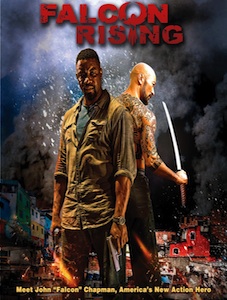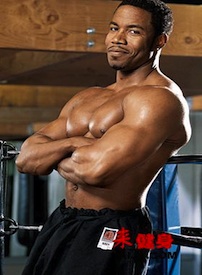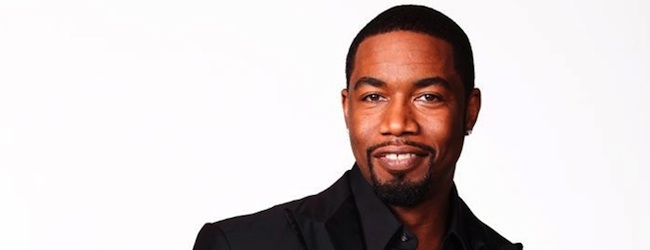Where to watch Interv
Michael Jai White hails from Brooklyn, NY. Mr White’s teenage years earned him a reputation as one of the toughest and most feared fighters in Bridgeport, Ct. Finding Martial Arts and making money from tournaments and teaching gave the troubled youth a sense of pride. After a three year stint as a junior high school teacher, Mr. White continued to purse a career in the movie industry. Small roles in local theater and commercials eventually lead to his big-break portraying legendary pugilist ‘Iron’ Mike Tyson in the 1995 HBO movie. Mr. White has also portrayed Todd MacFarlane’s comic book anti-hero Spawn, in the first comic book movie to feature an African-American in the lead role. An eclectic career has seen Mr. White anchor roles in Tyler Perry’s movies and co-star with action icons Van Damme and Steven Seagal in genre flicks.
MovieMavs: Your latest film Falcon Rising was shot on location in Brazil, adding a strong atmosphere to the proceedings. Was the location a consideration for you when taking on the project?
Michael Jai White: Oh absolutely, you never want to do what has been done over and over before. Not only that, but Brazil is such an interesting world. Everything is amped up in Brazil just in nature. Any corruption we have here in the States, is nine-fold in Brazil, the stakes are higher to begin with.
MM: Throughout your career you have done both dramatic and action roles. What is it that attracts you to these characters?

MM: There are a number of scenes in Falcon Rising in which genre clichés are turned on their ear. Was this a conscious decision by yourself and the filmmakers?
MJW: I want to take into account the expectations of the moviegoers, I don’t want to bore them. We know they have seem similar stuff hundreds and hundreds of times. I don’t think that gives the viewer anything interesting. Firstly, the character being so steeped in reality, due to his battles with PTSD, this is the kind of thing superheroes are made of. They have such a pathology that makes them very unique but it’s also their strength. My character having that condition, which so many returning soldiers have, I thought was very responsible on the part of the filmmakers. I fell in love with that aspect first and foremost because they fashioned a hero who is flesh and blood, and very contemporary. I applaud that and realize the shoes I have to fill, these are real people who we see everyday. PTSD is a struggle that more and more Americans are dealing with. Once you have taken into account contemporary issues, it becomes unique and something that hasn’t been overdone.
MM: This felt like the first in a possible planned series of films. Would you return for a sequel?
MJW: This is absolutely set-up for sequel, in the same way that the Bourne Identity and Taken have done. This is a character who is flawed, but those flaws are part of what give him this great power.
MM: Boxer and daughter of ring legend Muhammad Ali, Layla Ali makes here debut here. How was working with the famous newcomer?
MJW: Layla Ali and I are friends, we have known each other for a number of years. I couldn’t think of anybody stronger to play this role, especially since we are intending on this to become a serial. She is someone who can handle action and it’s not a stretch of the imagination to foresee her defending herself. She is one of the strongest female role models out there, that’s not just physical but mental as well, she is inspiring in her entirety. Everything she applies herself to, she does extremely well. I’m proud to have her as a friend and doubly proud that this is her first movie.
MM: Describe your working relationship with director Ernie Barbarash

MM: in 2011 you directed your debut feature Never Back Down 2. Do you have further plans to direct or was that a one-time experience?
MJW: That movie was received very well. In fact we are getting set for me to direct Never Back Down 3, starting in November (2014). It will be shot here, in the States.
MM: Who and or what are your biggest inspirations?
MJW: Life is about living up to your potential. I have guys in front of me I look up to, Harrison Ford, George Clooney. Clooney especially, he’s a very eclectic guy who doesn’t seem to take himself too serious. But, he’s able to navigate wearing a lot of different hats, that’s somebody I identify with tremendously.
MM: Early on in your career, you portrayed Mike Tyson in a HBO movie. How do you approach that role objectively when people have such strong opinions about the man?

MJW: I had a unique insight in playing Tyson. He and I had so many similarities growing up. I was on my own at fourteen years old, and fighting grown men at that age in competitions. That’s something very rare, and its even rarer for a someone to receive accolades as a fighter at such a young age. It tends to put you in a place to realize the power of the pugilist, it supersedes economic power, it supersedes intelligence, everything. In a male dominated society people, especially males, acquiesce to the pugilist. Deep down everybody wants to have that power that you posses, above all other power. To understand that as a youngster was something I had a unique insight, or perspective in.
MM: Recently Jaime Foxx announced that he will be portraying Tyson in a feature film. Are you interested in seeing what another filmmaker and artist do with the same story?
MJW: I’m more curious than anything. My question is; Why now? The real Tyson is still here, it’s not like his life is a closed book. All the documentaries on him, including the ones he’s done himself, I can’t see what the upside is in making a movie about his life at this point. I think it invites a lot of rehashed criticism, maybe I’m just missing something. I look forward to seeing it and discovering the reason behind the project, Mike Tyson is still very much in the public eye.
MM: You have been known to be very physical in your films, are you suffering from nagging injuries due to the abuse on-set?
BM: I’m completely injury free. I swear that I can’t do anything I could do at 22, but there are a lot of things I can do now, that I couldn’t do then. When my weight is down below 220 pounds, I feel there is nothing I can’t do.

